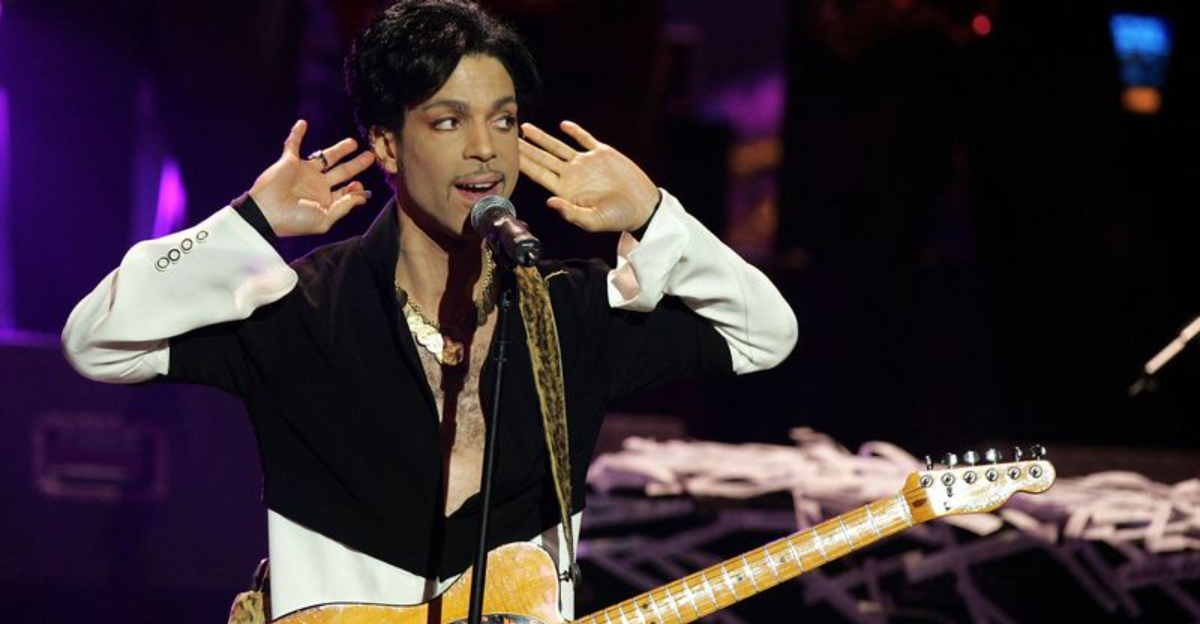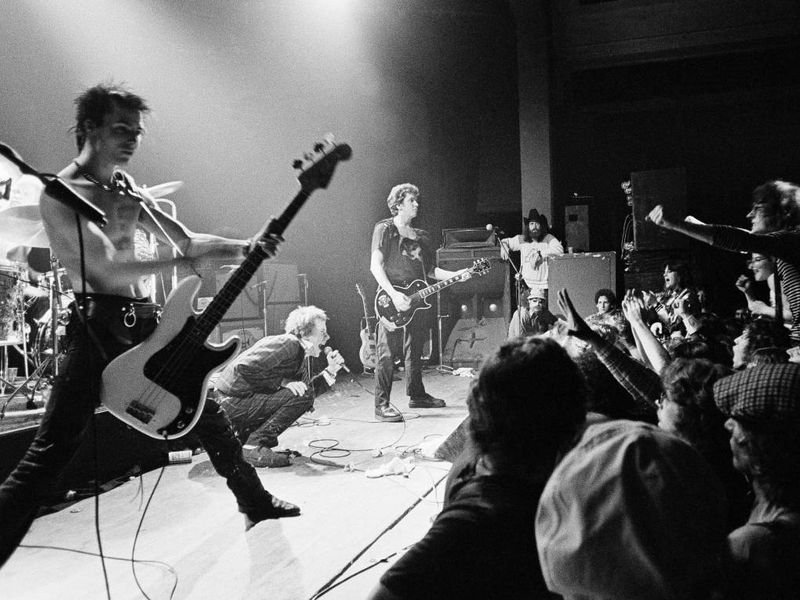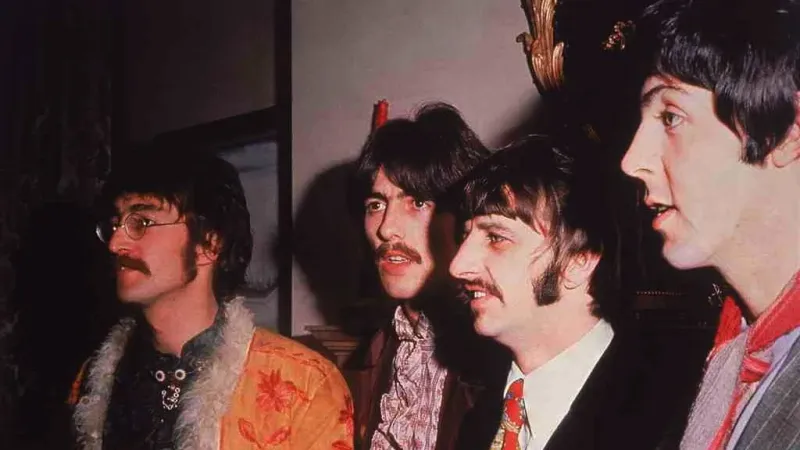Throughout music history, certain songs have been deemed controversial, leading to bans across various regions. These twelve tracks have sparked widespread debates, challenging societal norms and authority. Despite bans, they endure in popular culture.
1. “God Save the Queen” – S*x Pistols (1977)
When the S*x Pistols released “God Save the Queen,” it ignited a firestorm across the United Kingdom. Released during Queen Elizabeth II’s Silver Jubilee, this punk anthem was seen as a direct challenge to the monarchy. Its raw, defiant lyrics and aggressive tones captured the frustration of a generation feeling disenfranchised. Although banned by the BBC for its perceived treasonous nature, the song resonated with the youth. Despite the controversies, it climbed the charts, peaking just short of number one. The tension between the establishment and the punk movement was palpable, embodied in this rebellious call to arms.
2. “Relax” – Frankie Goes to Hollywood (1983)
In 1983, “Relax” by Frankie Goes to Hollywood became infamous after being banned by the BBC. Its suggestive lyrics and provocative music video were deemed too explicit for the airwaves. Ironically, the controversy only fueled its popularity, propelling it to the top of the charts. The band’s bold, unapologetic approach was mirrored in their style, a vibrant clash of sounds and visuals. This unexpected hit became an anthem for freedom of expression, challenging the limits of censorship in the music industry. Despite initial backlash, “Relax” remains a testament to the power of artistic rebellion.
3. “Kim” – Eminem (2000)
Eminem’s “Kim” is notorious for its brutal narrative, a visceral depiction of domestic turmoil. Released in 2000, it faced bans in numerous countries due to its graphic content and violent themes. Retailers hesitated to stock The Marshall Mathers LP, as the track’s raw emotion and anger swirled controversy. Eminem’s storytelling pushed boundaries, blurring lines between reality and art. His unapologetic approach forced listeners to confront uncomfortable truths. Despite the shock and outrage, “Kim” showcased Eminem’s lyrical prowess and ability to evoke intense emotions, leaving a lasting impact on the landscape of rap music.
4. “Killing in the Name” – Rage Against the Machine (1992)
Rage Against the Machine’s “Killing in the Name” resonates with an undeniable intensity. Released in 1992, its aggressive tone and anti-authoritarian message struck a chord with audiences. However, post-9/11, its defiant lyrics led to bans in some US radio stations. The repeated mantra, “F*** you, I won’t do what you tell me!” became a rallying cry against systemic oppression. The band’s explosive performances amplified the song’s impact, fostering a sense of rebellion. Despite censorship, “Killing in the Name” endures as a powerful anthem for resistance, challenging listeners to question authority and fight for justice.
5. “Cop Killer” – Body Count (1992)
Ice-T and Body Count’s “Cop Killer” stirred a national debate when released in 1992. Its raw message of anti-police sentiment led to bans and intense backlash from law enforcement and political figures. Protests erupted, and Ice-T received death threats, highlighting the song’s explosive impact. Despite its controversial nature, “Cop Killer” gave a voice to marginalized communities facing systemic oppression. The heated discourse surrounding the track forced society to confront critical issues of police brutality and racial injustice. Today, it stands as a stark reminder of the power of music as a form of protest and expression.
6. “I Wanna Be Your Dog” – The Stooges (1969)
In 1969, The Stooges unleashed “I Wanna Be Your Dog,” a primal ode to raw desire. Its gritty lyrics and rebellious tone led to bans in conservative regions. The track’s hypnotic repetition and Iggy Pop’s visceral delivery embodied the chaotic spirit of the era. Despite initial resistance, the song found its place as a cornerstone of punk rock. The Stooges’ uninhibited energy challenged societal norms, pushing the boundaries of acceptable art. Over time, “I Wanna Be Your Dog” became a cult classic, influencing countless musicians and leaving an indelible mark on the landscape of rock music.
7. “The Pill” – Loretta Lynn (1975)
Loretta Lynn’s “The Pill” sparked controversy in 1975, addressing birth control at a time when such topics were taboo. Many country radio stations banned it, fearing backlash from conservative audiences. However, Lynn’s bold stance on women’s reproductive rights resonated with listeners seeking change. Her unapologetic lyrics empowered women, reflecting a shift in societal attitudes. Despite initial censorship, “The Pill” became a significant milestone in country music. It highlighted the power of song to influence social norms and advance conversations about gender equality. Lynn’s contribution remains a testament to the transformative potential of music.
8. “Darling Nikki” – Prince (1984)
In 1984, Prince’s “Darling Nikki” caused a stir that led to the creation of the Parental Advisory label. Its explicit lyrics about masturbation shocked listeners and prompted calls for censorship. Despite the uproar, Prince’s uninhibited artistry captured raw emotions and pushed musical boundaries. The song’s sensual undertones and dynamic composition showcased his ability to blend genres seamlessly. Although controversial, “Darling Nikki” solidified Prince’s reputation as a provocative artist unafraid to challenge norms. It left an indelible mark on both fans and critics, highlighting the enduring impact of his creative genius in shaping the music industry.
9. “Lucy in the Sky with Diamonds” – The Beatles (1967)
The Beatles’ “Lucy in the Sky with Diamonds” faced bans by the BBC in 1967, suspected of promoting LSD. Despite the band’s denial of drug references, the song’s vivid imagery and surreal sound fueled speculation. Its dreamy composition and imaginative lyrics captivated listeners, becoming a hallmark of the psychedelic era. The controversy didn’t hinder its success; instead, it reinforced The Beatles’ innovative spirit. “Lucy in the Sky with Diamonds” remains a cultural icon, representing the transformative power of music during the ’60s. Its legacy endures, inspiring generations to explore creativity beyond conventional boundaries.
10. “Born in the USA” – Bruce Springsteen (1984)
Bruce Springsteen’s “Born in the USA” was banned in the USSR for its critical take on American society, often mistaken for a patriotic anthem. Released in 1984, the song addressed the struggles of Vietnam veterans, juxtaposing upbeat melodies with poignant lyrics. Its powerful message resonated globally, challenging listeners to reflect on national identity. Springsteen’s evocative storytelling and energetic performances cemented his status as a voice of the working class. Despite initial misinterpretations, “Born in the USA” endures as a testament to the complexities of American life, proving that music can transcend borders and spark important conversations.
11. “Aero Dynamik” – Kraftwerk (2003)
In 2003, Kraftwerk’s “Aero Dynamik” faced legal challenges in Germany due to its rhythm resembling an obscure 1970s song. This unexpected development led to its ban, sparking debates about originality and creative influence. Despite the setback, Kraftwerk’s innovative approach to electronic music remained influential. Their meticulous soundscapes and groundbreaking use of technology continued to inspire artists worldwide. “Aero Dynamik” showcased Kraftwerk’s commitment to pushing musical boundaries, blending mechanical precision with human emotion. Although controversial, the track affirmed their status as pioneers in electronic music, leaving a lasting impact on the genre’s evolution.
12. “WAP” – Cardi B ft. Megan Thee Stallion (2020)
In 2020, “WAP” by Cardi B featuring Megan Thee Stallion ignited debates across the globe. Its explicit lyrics led to bans and censorship on various platforms, with some conservative regions blocking it entirely. Despite the controversy, “WAP” became a cultural phenomenon, celebrating female empowerment and sexual liberation. The track’s bold, unapologetic nature resonated with audiences, challenging societal taboos around female sexuality. Its success highlighted the power of music to spark important conversations and redefine norms. Cardi B and Megan Thee Stallion’s collaboration remains a vivid example of modern artists pushing boundaries and embracing their truth.












